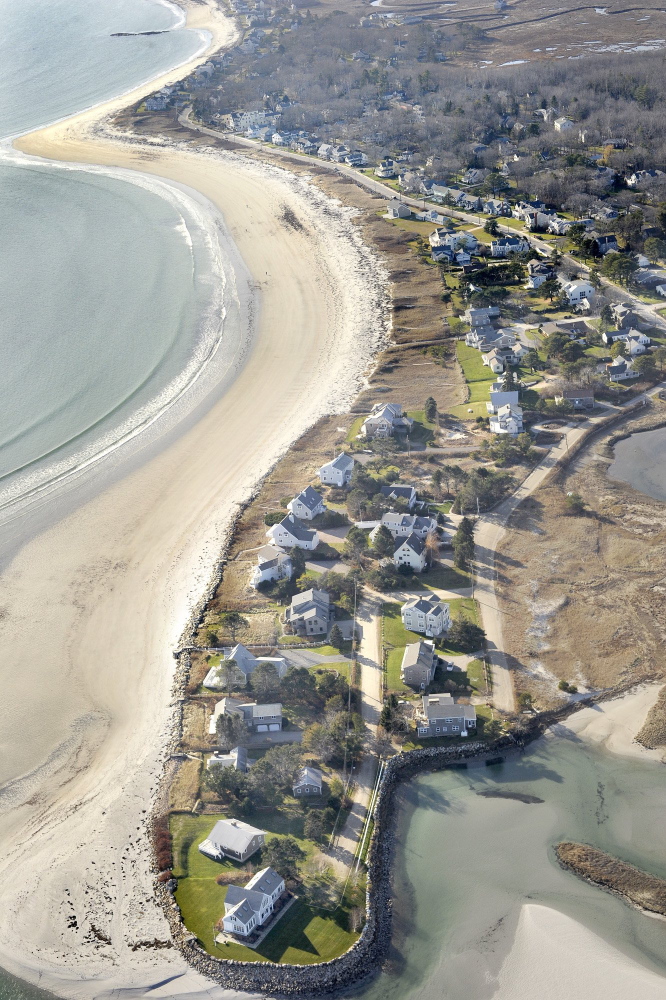The Maine Supreme Judicial Court heard arguments Wednesday in a rare reconsideration of one of its rulings, that the public does not have the right to use Goose Rocks Beach in Kennebunkport.
On Feb. 4, the state’s highest court ruled unanimously in favor of a group of 29 landowners whose properties front Goose Rocks Beach. The ruling overturned a Superior Court judge’s decision in 2012 that the public could use both the wet and dry sands of the beach for recreation. It also raised questions of whether the court was saying that beaches long been used by the public would be considered private.
Officials in nearby York went so far as to consider buying privately owned sections of beaches to preserve public access.
The supreme court agreed to reconsider after the town of Kennebunkport and the state filed motions saying the court had not addressed their arguments that Maine’s ocean waterfront is a public resource. They asked whether the Feb. 4 decision was overturning a decision the same court made in 2000.
“If these landowners bought property, they bought it knowing that, for over a century, not only was the public using the beach extensively, but the town was patrolling it with lifeguards and police and maintaining it for the benefit of the public,” Amy Tchao, an attorney for Kennebunkport, said in court Wednesday.
Tchao asked for clarification of whether the Feb. 4 decision overturned Eaton v. the town of Wells in 2000, in which the court said the town and the public have a right to use the dry sand and the intertidal, wet sand on Wells Beach.
The supreme court said in its ruling Feb. 4 that it was “premature” for it to decide arguments in the Goose Rocks Beach case regarding what is called the public trust doctrine. That 370-year-old rule says the owner of shoreland above the high tide mark is also the owner, in name, of the intertidal area but the public has a right to that wet area “to fish, fowl or navigate.”
The rule says nothing about sunbathing, swimming or surfing.
Goose Rocks Beach is a 2-mile-long beach bordered by 110 parcels of property with 95 separate owners. Nine of the lots are owned by the town or by the Kennebunkport Conservation Trust.
A section of beach a little wider than two football fields is now used by the public.
Much of the confusion seemed to stem from which issues had been settled in York County Superior Court and which ones have yet to be addressed. The Goose Rocks Beach case started in 2009, when the 29 landowners sued the town.
“We are at the point where the case should be back before the trial judge for further trial or further argument,” Chief Justice Leigh Saufley said during Wednesday’s hearing. “We’re not there yet because we want to make sure that the opinion we issued is clear enough for all the parties.”
Saufley asked the attorney for the state, Deputy Attorney General Paul Stern, whether the state intends to try the public trust doctrine at the Superior Court level.
“We already have,” Stern replied. “The record is very clear that the state litigated the public trust claims, and the town and the state and everyone knew it.”
Saufley interrupted Stern at one point, saying that none of the courts has yet decided who owns the wet sand areas, and that the town may have partial ownership.
It was left unclear whether the supreme court will decide that question.
An attorney for the landowners, Sidney Thaxter, said he understood from reading the motions for reconsideration that the town and state are seeking a second chance for the courts to decide property access rights on a lot-by-lot basis.
“The town waived its right to make a claim for a lot-by-lot decision,” Thaxter said. “You don’t get a do-over. It was tried, and the courts have made their decision.”
The court made no ruling after hearing arguments on the motions to reconsider, and gave no timetable for when it may issue an opinion.
Scott Dolan can be contacted at 791-6304 or at:
Twitter: @scottddolan
Send questions/comments to the editors.



Comments are no longer available on this story